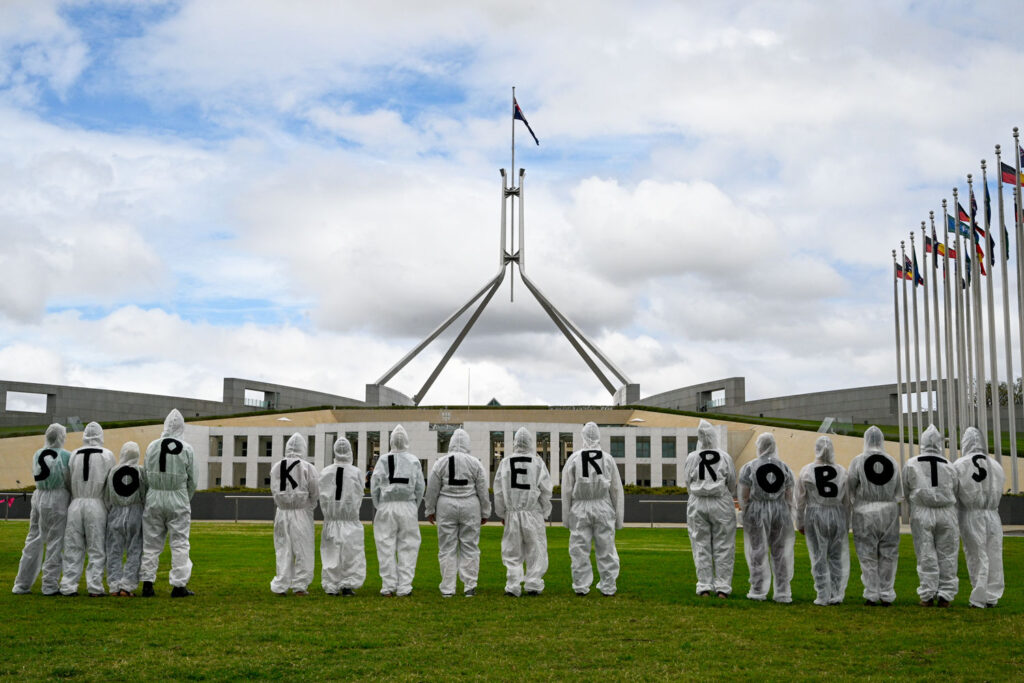Australia’s lacking and concerning position on autonomous weapons needs to be urgently reviewed
Australia’s lacking and concerning position on autonomous weapons needs to be urgently reviewed ahead of the Sixth Review Conference of the United Nations Convention on Certain Conventional Weapons (CCW), scheduled from 13-17 December in Geneva. Ahead of this critical Review Conference, the specialised diplomatic talks relating to the issue of autonomous weapons, called the ‘Group of Governmental Experts’ on lethal autonomous weapon systems (LAWS), will convene in Geneva for 5 days starting later today, Thursday 1 December. These talks will further discuss what should be done to address the threat of autonomous weapons systems, with a majority of countries already calling for the establishment of a new legally binding instrument.
Australia has an ethical obligation to support such an instrument that prohibits autonomous weapon systems that cannot be used with meaningful human control and on systems that would target human beings and regulate other autonomous weapons.
At the last GGE meeting in September, the Australian delegation’s comments were disappointing, which has unfortunately been seen in past meetings. Australia joins Russia, the US and the UK in supporting potential higher levels of autonomy in future weapon systems, as well as opposing language that limits autonomy or suggests any prohibitions. Throughout this meeting, the Australian delegation provided seemingly constructive suggestions on surface level changes, but gave detrimental feedback on core substantive issues such as rejecting suggestions for articulating limits on autonomy. This conduct emphasised Australia’s woeful unwillingness to cooperate and commit to the protection of international peace and security.
Prime Minister Scott Morrison recently stated that ‘Australia cannot shy away from the ethical implications of new technologies’, whilst making a speech for Australian Strategic Policy Institute (ASPI)’s Sydney Dialogue series. This is ironic, as Australia is embracing emerging technologies and autonomous weapons without meaningfully engaging in the ethical concerns and considerations. A paper prepared for Defence, titled ‘The Methodology of Ethical AI in Defence’, fails to even mention the core ethical problem of delegating decisions over life and death to a machine. The paper instead suggests frameworks to ‘de-risk’ AI Defence projects, which is inadequate if ensuring meaningful human control over the use of force is not a central element.
The recently announced AUKUS pact and Australia’s subsequent acquisition of nuclear submarine technology has been widely reported, but the trilateral security partnership between the US, UK and Australia involves a lot more than just nuclear technology. The AUKUS pact facilitates further cooperation and collaboration between the three states, in regards to cyber capabilities, artificial intelligence and quantum technologies. AUKUS is a long-term commitment to controlling the future of the Indo-Pacific, that also embeds Australian defence with the policy goals of the US and UK, two states which are advancing the development of autonomous weapons. Australia must assert its own policy with regard to autonomous weapons, in our own national interest – expressly ruling out certain systems and supporting a new legal instrument.
In another commitment to regional security and cooperation in the Indo-Pacific, the Australia-India-Japan-US Security Quadrilateral Dialogue (Quad Alliance) was formed. Similar to the AUKUS pact, the QUAD alliance promotes the collaboration and sharing of emerging technologies between the member states. India has previously invested in the research and development of autonomous weapons, and joined Japan and Australia at the recent Group of Governmental Experts meeting in September, in voicing their support of autonomous weapons, as well as claiming that these weapon systems have significant benefits and virtues. Australia is choosing to align itself with the few countries that do not support the urgent action needed to deal with the threat proliferation that increasingly autonomous weapons pose. We urge the government to reconsider this path.
Parliamentarians have scrutinised the current Australian position on autonomous weapons, but have been met with a disappointing response. In August 2021, Josh Wilson MP put forth questions to the Department of Defence, pertaining to Australia’s position on LAWS. The Defence representative responded that:
‘An attempt to ban or to otherwise agree on a new legal framework to regulate autonomous weapons systems is premature, as there is a lack of consensus and understanding of the technology’
A ban on LAWS is not premature. It is overdue.
The possibilities of weapon systems that make consequential life and death decisions without the meaningful control by a human, could lead to destruction and death on a mass scale, as well as signifying a new future of unpredictable conflict and global instability.
In the response by Defence to Josh Wilson MP, they also stated that autonomous weapons ‘could have the potential to save lives by minimising casualties and collateral damage, and reducing the risk to Defence personnel’. This belief that autonomous weapons can aid in harm reduction in conflict was also voiced at the recent Group of Governmental Experts meeting in September by the Australian delegation. However, if conflicts of the future increasingly introduce autonomous weapons, without limits, then the potential for conflict escalation and political instability is increased dramatically, as well as the dehumanisation of warfare.
Last week on 23 November 2021, Maria Vamvakinou MP made a stirring speech at Federal parliament in order to raise awareness about the need for Australia to support a legally binding instrument emphasising that prohibitions and limits are imperative, as it will protect human rights and global stability into the future. Maria Vamvakinou MP noted that the:
‘Global proliferation of increasingly autonomous weapons is occurring amidst the absence of new international regulations’
Vamvakinou indicated that Australia should support the establishment of a legally binding international ban, as well as consider domestic regulations centred in human control. She considered such action to also be critical in the ‘future proofing of our human rights.’
The sixth Review Conference of the CCW, to be held in Geneva on 13-17 December, offers world governments the opportunity to agree to establish a new legally binding instrument. This is the policy action urgently required. Whilst to date, the Australian government position has been regrettable, it is not too late to progress our policy. The government needs to urgently consider the risks of autonomous weapon proliferation, as well as the precedent it sets, whereby our country is seemingly okay with weapon systems that kill and destroy, without meaningful human control. The future beckons, and with it, a sense of urgent responsibility and a commitment to ethical technological use, as well an obligation from governments to foresee the dangers of emerging technologies.




